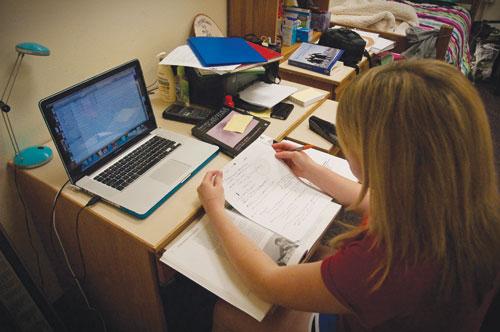
SMU freshman Jennifer Rogers studies for her sociology class involving family conflict Sunday evening inside of her residence hall living area. (TAYLOR HENRY/The Daily Campus)
Each week, freshman Jen Rogers juggles 18 hours of class, 16 hours of studying and three days of work.
Compared to high school, her stress levels are much higher.
“Although I was busy [in high school], I had my parents there to help out with small things like going to the grocery store or throwing a load of laundry in,” Rogers said. “But now, I’m responsible for what is going to or not going to happen.”
While the tough transition from high school to college is expected, a recent report conducted by UCLA’s Higher Education Research Institute, found this year’s class of U.S. college freshman to be extremely stressed.
In the study, this freshman class reported record-low levels of emotional health due to stress. According to the study “The American Freshman: National Norms,” this is the lowest level since 1985.
However, the study found that freshman students are willing to be overwhelmed if it would help them achieve a better education, leading to a better job in the future.
Rogers is just one of many freshman at Southern Methodist University who is trying to enjoy the college experience while still making good grades.
Jenny Smith, a freshman, agrees with Rogers. Compared to high school, she is more stressed.
“I have to budget my time more,” Smith said. “In high school it was just school from 8 a.m. to 3 p.m., but here it is so different. I have to find time for eating, working out, studying and resting.”
Andrew Pinkowitz, a business major with a double minor in communication studies and Spanish, said high school was a lot more stressful than college, in part due to AP classes.
“The thing that was so stressful about high school was just how much time everything demanded. I had no control over my schedule,” he said. “When I got to SMU, I relished the autonomy, and it appears to be helping my academics as well.”
Freshmen Richard Raizes and Kevin Lazares believe time management is the key to lowering stress levels.
Raizes, a double major in finance and economics, is more motivated to study in college.
“Most of my friends understand if I put studying as a priority over hanging out with them,” he said. “My grades are lot better than my high school ones.”
Smith’s grades have improved at SMU as well.
“I slacked off a lot in high school and didn’t really care about getting my work done,” she said. “But [in college] I know it is important to keep my grades up for extracurriculars.”
Part of the high stress levels the freshman class is undergoing is due to the economic problem in America. However, many SMU freshmen do not have jobs.
Though Rogers works three days a week in order to pay for gas, food and car insurance, Raizes chooses not to work.
“The extra income would not be worth a probable decrease in academic performance,” he said.
According to the study, nearly 58 percent of students said overall they would be pleased with their college experience.
The UCLA study was based on the responses from 201,818 first-time, full-time students at 279 of the nation’s four-year colleges and universities.








